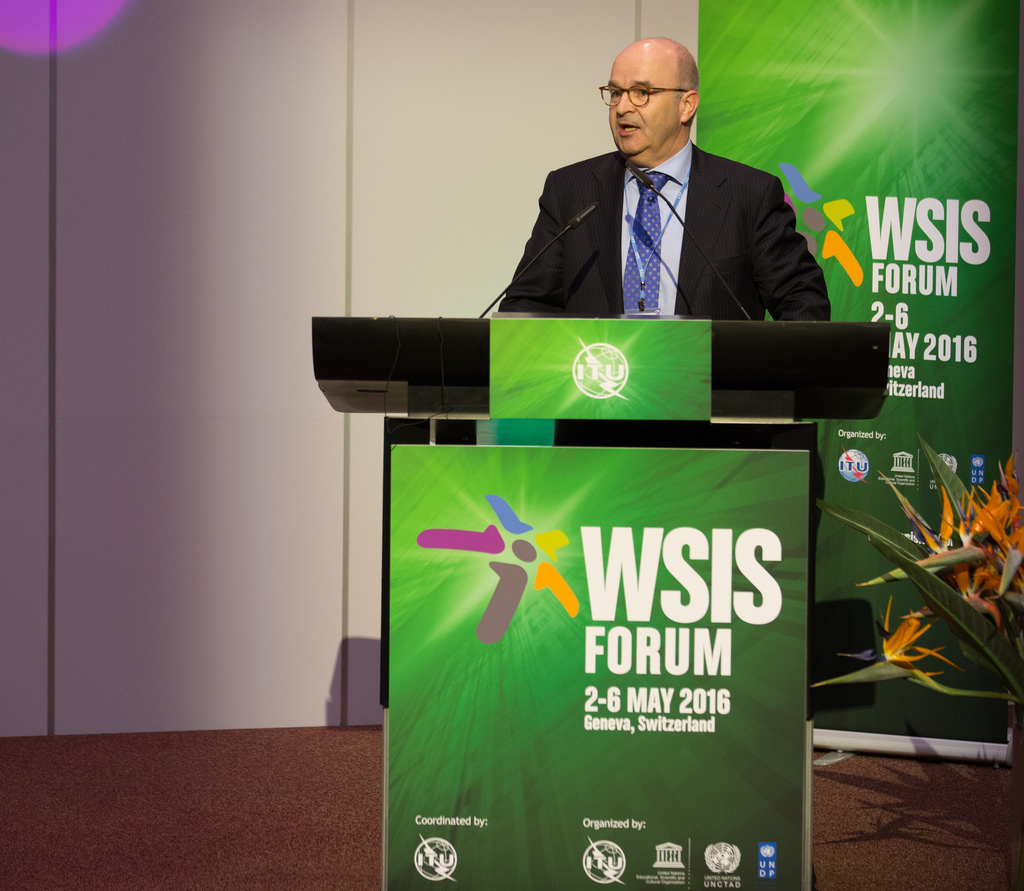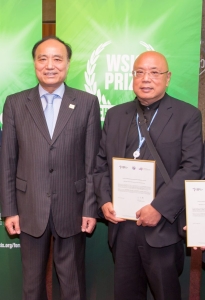IFIP Tells WSIS Forum 2016 of Plan to Help Countries Advance their Technology Capability
IFIP has invited developing nations to partner with it to build their technology expertise and capability.
IFIP President Leon Strous used his high level address to the WSIS (World Summit on the Information Society) Forum early this month to make the offer to countries and organisations wanting to improve their ICT capacity as a way of meeting the United Nations’ Sustainable Development Goals (SDGs) in areas such as education, health and addressing poverty.
Held in Geneva, Switzerland from 2-6 May, WSIS Forum 2016 is the world’s largest conference focused on harnessing the power of technology to drive development and sustainability, attracting over 1,800 delegates from around the world including over 85 government ministers and 250 high-level representatives. It is co-organized by ITU, UNESCO, UNDP AND UNCTAD along with various facilitators of the WSIS Action Lines.
Mr Strous said IFIP represents the largest collective of ICT expertise in the world with over half a million professionals, researchers and academics in its member societies – experts who are keen to make a difference in developing countries.
“Our members are happy to volunteer their knowledge and experience to improve outcomes for nations that are focused on enhancing their citizens’ quality of life through the application of technology,” he said.
“We can provide expertise to build infrastructure, advise on application development and offer knowledge in a range of specialist areas, but we need to partner with local organisations and governments so we can coordinate and tailor solutions for areas of greatest need,” he said.
To date, IFIP has sought to maximise knowledge transfer and information sharing by staging various technical conferences to which it invites representatives and practitioners from all over the developing world. “Our World Information Technology Forum (WITFOR) event in Costa Rica in September this year is specifically focused on bringing together ICT experts with developing nations to achieve positive results in relation to the SDGs.”
Mr Strous said IFIP’s offer of partnership has been warmly received by numerous countries and organisations who have expressed an interest in talking further about how they can leverage the expertise of the global body to help their people.
“We will focus significant time and resources in the coming weeks and months to follow up the initial contacts made at WSIS Forum and explore opportunities to engage in real world projects that can make a tangible contribution towards the SDGs,” he said.
IFIP took a contingent of five people to the WSIS Forum, between them conducting various workshops and presenting at various forums and meetings. Mr Strous was accompanied by:
- Brenda Aynsley, Chair of IFIP’s International Professional Practice Partnership (IP3);
- IP3 Deputy Chair, Moira de Roche;
- IP3 Board member, Raymond Morel; and
- Stephen Ibaraki, Chair of IFIP’s Global Industry Council, which was recognised with a WSIS Champion Award during the event.
Mr Ibaraki received the Champion Certificate from ITU Secretary-General, Houlin Zhao, during a special ceremony to honour organisations and individuals making a significant impact in progressing the SDGs, after receiving the most global votes out of more than 240,000 overall and best reviews from the WSIS expert group.
IFIP and IP3 were involved in several workshops during WSIS Forum 2016, on:
- Monday 2nd May about IFIP’s biennial WITFOR event – to be held in Costa Rica in September 2016 – which is focused on progressing the UN’s Sustainable Development Goals (SDGs);
- Monday 2nd on Information Security in Developing Countries;
- Thursday 5th May entitled, “The Contribution IFIP IP3 Makes to WSIS IDGs, With an Emphasis on Providing Trustworthy ICT Infrastructure and Services’; and
- Thursday 5th May on, “Emerging ICT Trends: Open Source Technologies for Sustainable Development”.
At the Open Source panel, Mr Strous talked about the current state of play of the open source sector, the opportunities and potential pitfalls for developers, and recent open government initiatives, including a major partnership between the US and Indian Governments.
Attendees also heard about the importance of the open source trend, particularly for governments like Estonia, which has built its e-government and e-voting platforms on open source technologies, and its contributing to progressing the Sustainable Development Goals.







